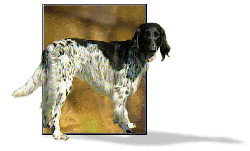Breed: Large Munsterlander
Temperament: Energetic, protective
Lifespan: 8-12 years
Recommended for: Active families
The Large Munsterlander derives its name from the German region of Munster, where it was bred to point and retrieve game. There is a Small Munsterlander which is virtually unknown in Australia. While primarily a pet breed in Australia, Large Munsterlanders are a popular gundog in the United Kingdom.
Appearance: This a large breed standing 58-65cm (23-25.5″) and weighing 25-30kg (55-65lb). They are sometimes confused with English Setters and English Springer Spaniels, also medium to large black and white dogs. Munsterlanders usually have darker heads and sharper muzzles than either of these breeds.
The head should be solid black but a white blaze, snip or star is allowed. The body can be white or blue roan with patches or flecks of black. The coat is mid-length with “feathering” (fringing) on the backs of the legs and tail.
Temperament: Owners say Munsterlanders are energetic dogs who love to be with people all day. They aren’t for people who think a dog must stay out of sight and out of mind. The dogs can be nervous, overprotective, jealous, boisterous, noisy and destructive if bored. Specialist trainers have known individual dogs to have a high degree of aggression towards other dogs.
Training: Training is recommended because of the large size and boundless enthusiasm of the Munsterlander.
Cost & feeding: This breed is not common: there are only about 200 in Australia and sometimes only two litters bred annually. Pups should cost $400-$600.
Owners recommend limiting food colouring and preservatives in the diet because there seems to be a breed sensitivity to skin disorders and some owners believe additives can aggravate this problem.
Health:
Hip dysplasia is an hereditary problem causing degeneration of the hip joint. It is known in this breed and prospective buyers should check the hip score of the pup’s parents. Owners warn against buying a pup whose parents score above 20 as the risk of the pup developing hip dysplasia is very high. Some bloodlines have skin problems with a heightened sensitivity to fleas and grasses. Owners of these dogs limit food additives but vets believe the problem is often hereditary.
Space & exercise: This is an active breed and not suited to a flat. Ideally Munsterlanders need an hour’s daily walk and will thrive on extra activities such as obedience and agility training.
Grooming: Specialist breed books recommend daily brushing, but owners say pets keep in good shape if brushed for five minutes a week, with an occasional bath. The coat does need to be checked for ticks if in a risk area. The coat will shed twice annually and more frequent brushing at these times will reduce the amount of dropped hair on clothes and furniture.
History: It’s accepted that the breed developed from the rejected puppies of German Longhaired Pointers during the 1800s when dog breeding became more closely monitored. Any mixed-coloured pups born to the solid-brown German Longhaired Pointers were given away or destroyed. A population of these black and white dogs – which had the same quality background of pointing and retrieving – built up in farming and game-keeping families.
National contacts
To find up-to-date contacts for breeders, contact the following organisations.
Dogs NSW
http://www.dogsnsw.org.au/breeders-directory
Email: [email protected]
Phone: 1300 728 022 (NSW only) or (02) 9834 3022
Fax: (02) 9834 3872
Dogs Victoria
http://www.vca.org.au
Email: [email protected]
Phone: (03) 9788 2500
Fax: (03) 9788 2599
Dogs ACT
http://www.actca.asn.au
Email: [email protected]
Phone: (02) 6241 4404 – Fax: (02) 6241 1129.
Dogs West
http://www.cawa.asn.au
Email: [email protected]
Phone: (08) 9455 1188
Fax: (08) 9455 1190
Dogs SA
http://dogssa.com.au
Phone: (08) 8349 4797
Canine Control Council of Queensland
http://www.cccq.org.au
Email: [email protected]
Phone: (07) 3252 2661
Fax: (07) 3252 3864
Tasmanian Canine Association
http://www.tasdogs.com
Email: [email protected]
Phone: (03) 6272 9443
Fax: (03) 6273 0844
Dogs NT
http://www.territorydogworld.com
Email: [email protected]
Phone: (08) 8984 3570
Fax: (08) 8984 3409



